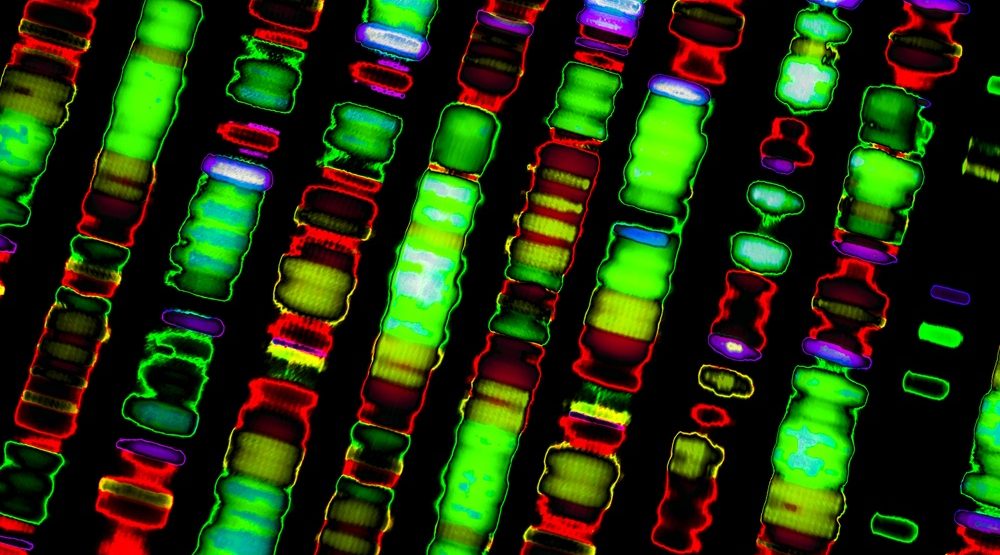DNA is the building blocks of organic life on our planet. A complicated web of data that is still the subject of constant study, scientists see medical and commercial potential in unlocking different species’ complete genomes — including cannabis.
copyright by dailyhive.com
 DNA is the building blocks of organic life on our planet. A complicated web of data that is still the subject of constant study, scientists see medical and commercial potential in unlocking different species’ complete genomes — including cannabis.
DNA is the building blocks of organic life on our planet. A complicated web of data that is still the subject of constant study, scientists see medical and commercial potential in unlocking different species’ complete genomes — including cannabis.
A genome is an organism’s complete set of DNA and according to the US National Library of Medicine, contains all of the information needed to build and maintain that life, whether it be plant or animal.
“The genome is the coding we have in our unique DNA. Every cell of our body. It’s made up of half the code from our mother and half the code from our father. And this is true for also plants and animals,” professional genome mapper Dr. Gil Ronen told Grow.
Ronen is the president and co-founder of NRGene, an Isreali company that specializes in sequencing the genomes of plants and animals for industries using artificial intelligence. The company has successfully resolved the sequences of genomes for wheat, rye, oats and more — far more than others before.
According to Ronen, all DNA codes are a very long chain of chemicals, made up of four different chemical building blocks — represented by the letters A (adenine), G (guanine), C (Cytosine) and T (Thymine). A complete genome is hundreds of millions of these letters long.
“This is the book of life,” said Ronen. “Everything we do is encoded in this very big book.”
Sequencing a complete DNA genome is no small matter. Even the human genome, according to Ronen, has not been completely sequenced — despite billions of dollars spent.
Thank you for reading this post, don't forget to subscribe to our AI NAVIGATOR!
Eliminating these gaps is a key part of understanding any species genetics. And while sequencing individual human genomes is a means for understanding human diseases and developing medicines, the commercial aspects of plant genomes go even further. According to a review article published in the botanical journal Applications in Plant Science, whole plant genomes can be used for “investigations into fundamental evolutionary and ecological questions,” and a better understanding of “the genomic diversity of ecotypes, geographical isolates, and related species.”
The process of sequencing has become considerably more advanced over time as technology progresses. Thankfully, “it’s very complicated to do, it’s not that complicated to explain,” said Ronen.
The most common technique involves placing chemical extract from cells into a machine that spits out an incomplete portion of the DNA code in the form of the letters AGCT. Some machines will offer 100 letters and some very sophisticated machines can give up to 100,000 letters, according to Ronen.[…]
read more – copyright by dailyhive.com


DNA is the building blocks of organic life on our planet. A complicated web of data that is still the subject of constant study, scientists see medical and commercial potential in unlocking different species’ complete genomes — including cannabis.
copyright by dailyhive.com
A genome is an organism’s complete set of DNA and according to the US National Library of Medicine, contains all of the information needed to build and maintain that life, whether it be plant or animal.
“The genome is the coding we have in our unique DNA. Every cell of our body. It’s made up of half the code from our mother and half the code from our father. And this is true for also plants and animals,” professional genome mapper Dr. Gil Ronen told Grow.
Ronen is the president and co-founder of NRGene, an Isreali company that specializes in sequencing the genomes of plants and animals for industries using artificial intelligence. The company has successfully resolved the sequences of genomes for wheat, rye, oats and more — far more than others before.
According to Ronen, all DNA codes are a very long chain of chemicals, made up of four different chemical building blocks — represented by the letters A (adenine), G (guanine), C (Cytosine) and T (Thymine). A complete genome is hundreds of millions of these letters long.
“This is the book of life,” said Ronen. “Everything we do is encoded in this very big book.”
Sequencing a complete DNA genome is no small matter. Even the human genome, according to Ronen, has not been completely sequenced — despite billions of dollars spent.
Thank you for reading this post, don't forget to subscribe to our AI NAVIGATOR!
Eliminating these gaps is a key part of understanding any species genetics. And while sequencing individual human genomes is a means for understanding human diseases and developing medicines, the commercial aspects of plant genomes go even further. According to a review article published in the botanical journal Applications in Plant Science, whole plant genomes can be used for “investigations into fundamental evolutionary and ecological questions,” and a better understanding of “the genomic diversity of ecotypes, geographical isolates, and related species.”
The process of sequencing has become considerably more advanced over time as technology progresses. Thankfully, “it’s very complicated to do, it’s not that complicated to explain,” said Ronen.
The most common technique involves placing chemical extract from cells into a machine that spits out an incomplete portion of the DNA code in the form of the letters AGCT. Some machines will offer 100 letters and some very sophisticated machines can give up to 100,000 letters, according to Ronen.[…]
read more – copyright by dailyhive.com
Share this: